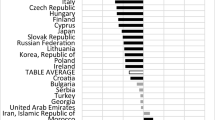Abstract
This study examined how mathematical experiences influence Dutch pupils' course enrollment in mathematics. Are gender differences in extracurricular, mathematics-related activities related to achievements in or attitudes towards mathematics, and consequently to differences between girls and boys in the selection of mathematics for their final examination curriculum? In total, 213 Dutch secondary education pupils (i.e., 139 females and 74 males) between the ages of 14 and 15 participated in this study. The frequency of their participation in 60 mathematics-related activities, their intelligence and attitudes toward mathematics were registered. In addition, the achievement grades in mathematics were obtained. The results revealed that extracurricular activities were related to achievement grades rather than to attitudes toward mathematics. Intellectual capacities, achievements, and feelings of adequacy in mathematics, rather than mathematics-related activities, discriminated between the pupils who selected or did not select mathematics for their final examination curriculum. No gender differences could be demonstrated in achievement grades for mathematics, nor in attitudes toward mathematics. These findings suggest that for Dutch secondary education students mathematics-related activities were stimulating, but not decisive for their choice of mathematics in their final examination curriculum.
Similar content being viewed by others
References
Bransford, J., Sherwood, R., Vye, N., & Rieser, J. (1986). Teaching thinking and problem solving.American Psychologist, 41 1078–1089.
CBS (Dutch Central Office for Statistics) (1993).Education since 1950. [in Dutch]. Voorburg, The Netherlands: CBS.
Dweck, C. S. (1986). Motivational processes affecting learning.American Psychologist, 41 1040–1048.
Eccles, J. S., & Jacobs, J. E. (1986). Social forces shape math attitudes and performance.Signs, 11 367–380.
Huberty, C. J. (1984). Issues in the use and interpretation of discriminant analysis.Psychological Bulletin, 95 156–171.
Hyde, J. S., Fennema, E., & Lamon, S. J., (1990). Gender differences in mathematics performance: A meta-analysis.Psychological Bulletin, 107 139–155.
Kay, R. (1992). An analysis of methods used to examine gender differences in computer-related behavior.Journal of Educational Computing Research, 8 277–290.
Kuyper, H., & van der Werf, M. P. C. (1991). The influence of teachers upon gender differences in mathematics [in Dutch].Tijdschrift voor Onderwijsresearch, 16 13–18.
Licht, B. G., & Dweck, C. S. (1984). Determinants of academic achievement: The interaction of children's achievement orientations with skill area.Developmental Psychology, 20 628–636.
Martinot, M. J., Kuhlemeier, H. B., & Feenstra, H. J. M. (1988). Measuring affective goals: Validation and standardization of the Attitude Scale towards Mathematics [in Dutch].Tijdschrift voor Onderwijsresearch, 13 65–76.
Meece, J. L., Eccles Parsons, J. E., Kaczala, C. M., Goff, S. B., & Futterman, R. (1982). Sex differences in math achievement: Toward a model of academic choice.Psychological Bulletin, 91 324–348.
Meece, J. L., Wigfield, A., & Eccles, J. S. (1990). Predictors of math anxiety and its influence on young adolescents' course enrolment intentions and performance in mathematics.Journal of Educational Psychology, 82 60–70.
Newcombe, N., Bandura, M. M., & Taylor, D. G. (1983). Sex differences in spatial ability and spatial activities.Sex Roles, 9 377–386.
Raven, J. C., Court, J. H., & Raven, J. (1983).Manual for Raven's Progressive Matrices and Vocabulary Scales London: Lewis.
Resnick, L. B. (1989). Introduction. In L. B. Resnick (Ed.),Knowing, learning, and instruction. Hillsdale NJ: Erlbaum.
Signorella, M. L., Krupa, M. H., Jamison, W., & Lyons, N. (1986). A short version of a spatial activity questionnaire.Sex Roles, 14 475–479.
Signorella, M. L., Jamison, W., & Krupa, M. H. (1989). Predicting spatial performance from gender stereotyping in activity preferences and in self-concept.Developmental Psychology, 25 89–95.
Taal, M. (1990a). Determinants of girls' choices of mathematics.Journal for High Ability, 1 42–46.
Taal, M. (1990b). Gender differences in spatial abilities: Different experiences? [in Dutch].Tijdschrift voor Ondelwijsresearch, 15 355–361.
Tracy, D. M. (1987). Toys, spatial ability, and science and mathematics achievement: Are they related?Sex Roles, 17 115–138.
Author information
Authors and Affiliations
Additional information
The author wishes to express her gratitude to Fernanda Sampaio de Carvalho for gathering the data that formed the basis for this study.
Rights and permissions
About this article
Cite this article
Taal, M. How do mathematical experiences contribute to the choice of mathematics. Sex Roles 31, 757–769 (1994). https://doi.org/10.1007/BF01544291
Issue Date:
DOI: https://doi.org/10.1007/BF01544291



